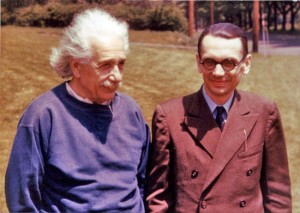ublo
bogdan's (micro)blog
bogdan » 1st incompletness theorem
12:35 am on Sep 15, 2012 | read the article | tags: nice2know
or better stated, unless we have infinite uncountable processing power we will never be able to describe the universe starting from our knowledge.
in 1931, at 25 years old, Kurt Goedel proved two theorems central to modern science. named incompleteness theorems, they set a bound on the limit of our knowledge at a specific time, pushing the “know it all” objective far beyond any imaginable horizon and extending our quest indefinitely.
1st incompletness theorem (as stated by Stephen Cole Kleene in 1967)
Any effectively generated theory capable of expressing elementary arithmetic cannot be both consistent and complete. In particular, for any consistent, effectively generated formal theory that proves certain basic arithmetic truths, there is an arithmetical statement that is true, but not provable in the theory.
in simple words the theorem states that starting with a finite set of rules that can generate numbers and simple arithmetic on them, there are statements that cannot be proven or unproven using only the starting rules. more over, there’s no algorithm that can extend (even infinitely) the initial set of rules in order to cover all the statements involving the constructed numbers. the theorem scales up to the size of the universe as all modern physics theories extend the simple arithmetic on natural numbers, thus in any physical system (as understood today) there are properties of the system components that will lay outside the boundaries of our knowledge.
definitions: uncountably infinite.

photo: Oskar Morgenstern, institute of advanced study archives
find me:
in my mind:
- #artist 2
- #arts 4
- #away 3
- #bucharest 1
- #buggy 2
- #business 1
- #clothes 1
- #comics 1
- #contest 3
- #dragosvoicu 1
- #education 1
- #food 2
- #free-ideas 1
- #friends 14
- #hobby 22
- #howto 9
- #ideas 29
- #life lessons 3
- #me 59
- #mobile fun 4
- #music 51
- #muvis 17
- #muviz 13
- #myth buxter 1
- #nice2know 15
- #night out 1
- #openmind 2
- #outside 3
- #poems 4
- #quotes 1
- #raspberry 4
- #remote 56
- #replied 51
- #sci-tech 7
- #sciencenews 1
- #sexaid 6
- #subway 39
- #th!nk 4
- #theater 1
- #zen! 4